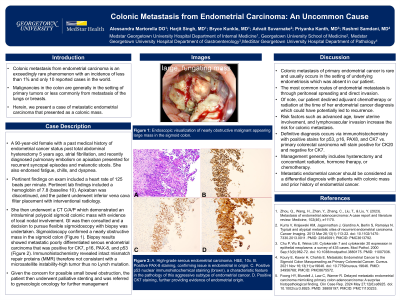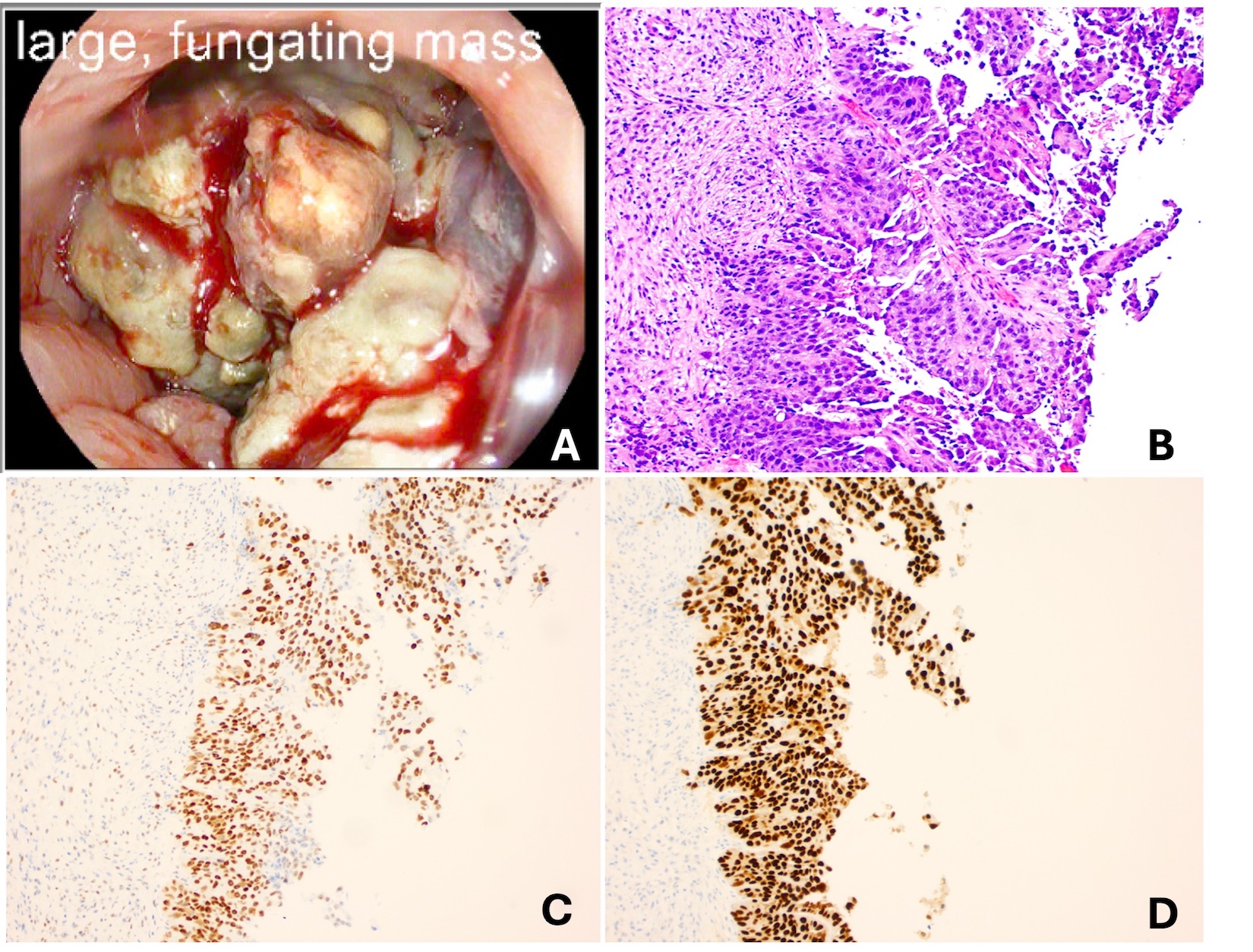Sunday Poster Session
Category: Colon
P0346 - Colonic Metastasis From Endometrial Carcinoma: An Uncommon Cause
Sunday, October 27, 2024
3:30 PM - 7:00 PM ET
Location: Exhibit Hall E

Has Audio

Alessandra Martorella, DO
MedStar Georgetown University Hospital
Norristown, PA
Presenting Author(s)
Alessandra Martorella, DO, Harjit Singh, MD, MBA, Bryce Kunkle, MD, Advait Suvarnakar, BS, Rashmi Samdani, MD, Priyanka Kanth, MD
MedStar Georgetown University Hospital, Washington, DC
Introduction: Colonic metastasis from endometrial carcinoma is an exceedingly rare phenomenon with an incidence of less than 1% and only 10 reported cases in the world. Malignancies in the colon are generally thought to be in the setting of primary tumors or metastasis from the lungs or breasts. Herein, we present a case of metastatic endometrial carcinoma presenting as a colonic mass.
Case Description/Methods: A 90-year-old female with a past medical history of endometrial cancer status post total abdominal hysterectomy 5 years ago, atrial fibrillation, and recently diagnosed pulmonary embolism on apixaban presented for recurrent syncopal episodes and melanotic stools. She also endorsed fatigue, chills, and dyspnea. Pertinent findings on exam included a heart rate of 125 beats per minute. Pertinent lab findings included a hemoglobin of 7.8 (baseline 10). Apixaban was discontinued and an IVC filter was placed.
She then underwent a CT C/A/P which demonstrated an intraluminal polypoid sigmoid colonic mass with evidence of local nodal involvement. GI was consulted and a decision to pursue flexible sigmoidoscopy was undertaken. Sigmoidoscopy confirmed a nearly obstructive mass in the sigmoid colon (Fig 1). Biopsy results showed metastatic poorly differentiated serous endometrial carcinoma that was positive for CK7, p16, PAX-8, and p53 (Fig 1). Immunohistochemistry (IHC) revealed intact mismatch repair proteins therefore not consistent with a microsatellite instability-high tumor thus no Lynch mutation. Given the concern for possible small bowel obstruction, the patient underwent palliative stenting and was referred to gynecologic oncology for further management.
Discussion: Colonic metastasis of primary endometrial cancer is rare but typically occurs from peritoneal spreading and direct invasion. The risk of colonic metastasis is typically increased in patients with underlying endometriosis, advanced age, lower uterine involvement, and lymphovascular invasion. Of note, our patient did decline treatment at the time of her cancer diagnosis 5 years ago which could explain its recurrence. Definitive diagnosis occurs via IHC demonstrating positive p53, p16, PAX8, and CK7 staining versus patients with colorectal carcinoma who stain positive for CK20. Management generally includes hysterectomy and concomitant radiation, hormone therapy, or chemotherapy. Metastatic endometrial cancer should be considered as a differential diagnosis with patients with colonic mass and prior history of endometrial cancer.

Disclosures:
Alessandra Martorella, DO, Harjit Singh, MD, MBA, Bryce Kunkle, MD, Advait Suvarnakar, BS, Rashmi Samdani, MD, Priyanka Kanth, MD. P0346 - Colonic Metastasis From Endometrial Carcinoma: An Uncommon Cause, ACG 2024 Annual Scientific Meeting Abstracts. Philadelphia, PA: American College of Gastroenterology.
MedStar Georgetown University Hospital, Washington, DC
Introduction: Colonic metastasis from endometrial carcinoma is an exceedingly rare phenomenon with an incidence of less than 1% and only 10 reported cases in the world. Malignancies in the colon are generally thought to be in the setting of primary tumors or metastasis from the lungs or breasts. Herein, we present a case of metastatic endometrial carcinoma presenting as a colonic mass.
Case Description/Methods: A 90-year-old female with a past medical history of endometrial cancer status post total abdominal hysterectomy 5 years ago, atrial fibrillation, and recently diagnosed pulmonary embolism on apixaban presented for recurrent syncopal episodes and melanotic stools. She also endorsed fatigue, chills, and dyspnea. Pertinent findings on exam included a heart rate of 125 beats per minute. Pertinent lab findings included a hemoglobin of 7.8 (baseline 10). Apixaban was discontinued and an IVC filter was placed.
She then underwent a CT C/A/P which demonstrated an intraluminal polypoid sigmoid colonic mass with evidence of local nodal involvement. GI was consulted and a decision to pursue flexible sigmoidoscopy was undertaken. Sigmoidoscopy confirmed a nearly obstructive mass in the sigmoid colon (Fig 1). Biopsy results showed metastatic poorly differentiated serous endometrial carcinoma that was positive for CK7, p16, PAX-8, and p53 (Fig 1). Immunohistochemistry (IHC) revealed intact mismatch repair proteins therefore not consistent with a microsatellite instability-high tumor thus no Lynch mutation. Given the concern for possible small bowel obstruction, the patient underwent palliative stenting and was referred to gynecologic oncology for further management.
Discussion: Colonic metastasis of primary endometrial cancer is rare but typically occurs from peritoneal spreading and direct invasion. The risk of colonic metastasis is typically increased in patients with underlying endometriosis, advanced age, lower uterine involvement, and lymphovascular invasion. Of note, our patient did decline treatment at the time of her cancer diagnosis 5 years ago which could explain its recurrence. Definitive diagnosis occurs via IHC demonstrating positive p53, p16, PAX8, and CK7 staining versus patients with colorectal carcinoma who stain positive for CK20. Management generally includes hysterectomy and concomitant radiation, hormone therapy, or chemotherapy. Metastatic endometrial cancer should be considered as a differential diagnosis with patients with colonic mass and prior history of endometrial cancer.

Figure: Figure 1. A. Endoscopic visualization of nearly obstructive malignant appearing large mass in the sigmoid colon. B. H&E stain, 20x. High-grade serous endometrial carcinoma. C. H&E stain, 20x. Positive p53 nuclear immunohistochemical staining (brown), a characteristic feature in the pathology of this aggressive subtype of endometrial cancer. D. H&E stain, 20x. Positive PAX-8 staining, characteristic of endometrial cancer.
Disclosures:
Alessandra Martorella indicated no relevant financial relationships.
Harjit Singh indicated no relevant financial relationships.
Bryce Kunkle indicated no relevant financial relationships.
Advait Suvarnakar indicated no relevant financial relationships.
Rashmi Samdani indicated no relevant financial relationships.
Priyanka Kanth indicated no relevant financial relationships.
Alessandra Martorella, DO, Harjit Singh, MD, MBA, Bryce Kunkle, MD, Advait Suvarnakar, BS, Rashmi Samdani, MD, Priyanka Kanth, MD. P0346 - Colonic Metastasis From Endometrial Carcinoma: An Uncommon Cause, ACG 2024 Annual Scientific Meeting Abstracts. Philadelphia, PA: American College of Gastroenterology.
